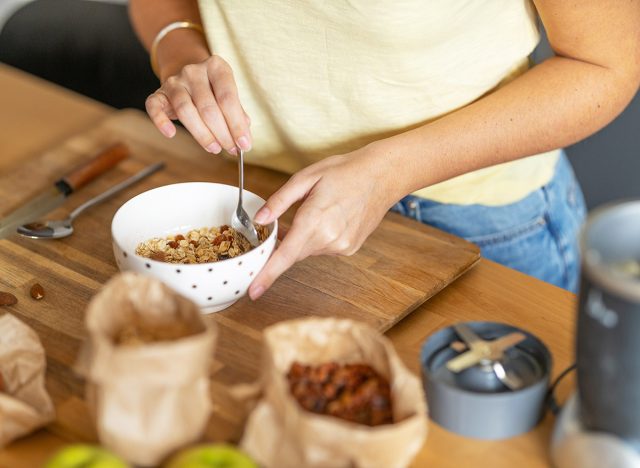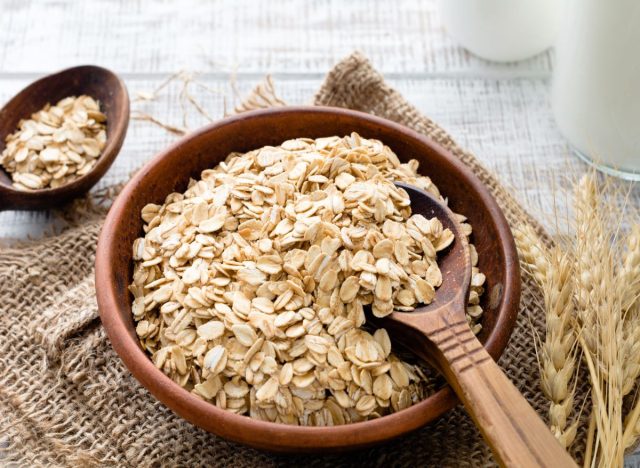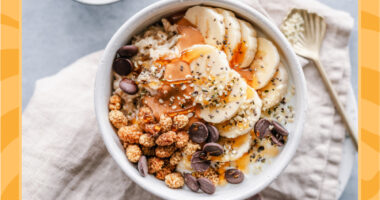If you were to picture what happens when you dig into a bowl of oatmeal in the morning, you might imagine the benefits of each bite dispersing out to various parts of your body. After all, oats are well known for protecting your heart, strengthening your blood vessels, and slimming your waistline. But they also have a lot to offer the body part where they spend the most time: your gut!
As a whole grain food full of fiber, antioxidants, and other nutrients, oatmeal flexes some heavy-duty force for good in your belly. Here’s a look at what this versatile, down-to-earth breakfast food can do as it makes its way through your GI tract. And don’t miss the healthiest way to cook oatmeal!


If we’re talking gut health, we might as well start with the function that affects us everyday: our bathroom habits. Abundant research has examined how your morning oatmeal bowl could help you while, well, on the bowl. One large systematic review in the British Journal of Nutrition found that, in people with no history of bowel disease, oats and oat bran could significantly increase stool weight and decrease constipation.
It’s likely that the bran portion of the oat grain is responsible for oatmeal’s ability to get things moving. In a 2008 study on nursing home residents, those who received an oat bran supplement were more likely to be able to stop using laxative medications. And it’s not just older people who can benefit from oatmeal’s evacuating effects. A 2020 study on children concluded that oatmeal might reduce constipation symptoms like gas, straining, and a feeling of incomplete evacuation.


You may have noticed oatmeal packaging boasting of its soluble fiber content. And it’s true: oatmeal is among the best sources of this nutrient. So what’s the big deal about soluble fiber?
Among its many benefits (like lowering cholesterol and improving blood glucose control), this form of fiber has some pretty special effects on your gut. Because it creates a viscous, gel-like substance in the GI tract, it can actually slow down digestion, keeping you fuller longer.
In fact, research shows that a form of soluble fiber called beta-glucan, especially plentiful in oats, increases the perception of satiety. Besides preventing the annoyance of mid-morning snack cravings, staying full can help you reach your weight loss goals.
Just don’t fall prey to the worst oatmeal habits for weight loss!
READ RELATED: Over 75% of Long COVID Patients Have This in Common


We’re not done with you yet, fiber! These days, we all hear a lot about the importance of maintaining a healthy microbiome—AKA the trillions of bacteria inhabiting our gut. One excellent way to boost the health of the all-important microbiome is to feed it the right kind of fiber, known as prebiotic fiber.
Here’s where beta-glucan shines again. As a prebiotic fiber, it’s been shown to help improve the growth and colonization of certain helpful strains of gut bacteria. A microbiome rich in healthy bacteria has been linked to all sorts of health benefits, like reduced risk of type two diabetes, depression, and obesity.


If you live with celiac disease or inflammatory bowel disease (IBD), don’t be surprised if your doctor or dietitian recommends oatmeal for your morning meal. Some research has found that eating more oat bran could result in small improvements in symptoms of ulcerative colitis.
Meanwhile, since oats are gluten-free, they’re an ideal grain for folks with celiac disease. (Just be sure to purchase oatmeal that’s certified gluten-free—otherwise, you may end up with cross-contamination if they’re processed alongside wheat.) It’s even possible that oats’ microbiome-boosting prebiotic fiber could help reduce symptoms of celiac disease—though more research is needed to draw firm conclusions.
On the other hand, if you’re experiencing diarrhea during a celiac or IBD flare, you may prefer to avoid oats for a while. Some people find its soluble fiber to be too much for their GI tract to handle when suffering from loose bowels.
Sarah Garone, NDTR
Source:











